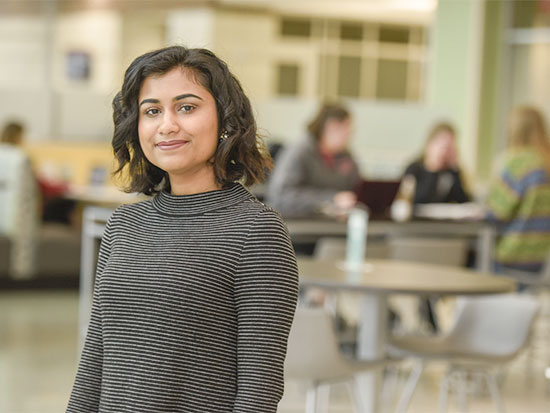 Mugdha Mokashi grew up in Madison, a high-achieving Huntsville suburb where one-fourth of her high school class had ACT scores of 30 or higher. This upbringing, the University of Alabama at Birmingham senior said, was “extremely privileged, with a lot of support. I never had that bubble pop.”
Mugdha Mokashi grew up in Madison, a high-achieving Huntsville suburb where one-fourth of her high school class had ACT scores of 30 or higher. This upbringing, the University of Alabama at Birmingham senior said, was “extremely privileged, with a lot of support. I never had that bubble pop.”
Then she came to UAB.
“When I saw medical clinics and I met friends who didn’t grow up in Madison,” she said, “I realized how systemically you can be deprived of the advantages Madison had. I got to know people who have had little support.”
One example: Her Science and Technology Honors program in UAB Honors College had a first-year course on basic lab procedures. “I had worked in a biotechnology organization in Huntsville, so I had experience,” Mokashi said, “but I had a friend who had never seen a pipette before.” The friend had come from a high school that offered only a single AP course.
“I realized that the world was unfair for so many people,” Mokashi said. “UAB gave me a passion for public service.”
Mokashi spent five semesters volunteering with Rape Response at the Crisis Center Birmingham, where she would be on-call 12 hours at a stretch.
| “I realized that the world was unfair for so many people. UAB gave me a passion for public service.” |
“If a client arrived, we would go to the center,” Mokashi said. “We would talk them through what happened, discuss potential options for filing reports, tell them about counseling, and provide support during a sexual assault exam conducted by a trained sexual assault nurse examiner provider.”
Mokashi served in the UAB Undergraduate Student Government Association for three years, as program coordinator, director of Student Issues and president.
“It is very frustrating, but in a positive way,” she said. “It involves negotiating with stakeholders who have different competing interests. We did get free menstrual hygiene essentials placed in all women’s bathrooms.”
Her most rewarding service was launching a student chapter of Unite for Reproductive & Gender Equity at UAB. The URGE website says it works to give all people agency over their own bodies and relationships, and give them the power and knowledge to exercise that agency.
“It was exciting,” Mokashi said, “because it felt like the beginning of organizations on campus related to the empowerment of women.”
Besides earning a neurosciences honors degree in the College of Arts and Sciences while working in the lab of Karen Gamble, Ph.D., UAB Department of Psychiatry and Behavioral Neurobiology, Mokashi will graduate with a master’s degree in public health with a concentration in health behavior from the UAB School of Public Health.
She served her public health internship in the Dominican Republic, speaking Spanish the entire summer. She helped conduct community interviews with a group researching barriers to accessing HIV treatment in Santo Domingo.
Mokashi is bound for medical school this fall, though she has not decided which of a fistful of prestigious offers to accept.
After four years in her labs, in classes, in her service, and in hundreds of hours shadowing physicians at Alabama hospitals and the UAB 1917 Clinic for HIV care, she plans to take a long-deferred family trip back to her birthplace in the Indian state of Maharashtra.
Mokashi had pluck growing up — she liked to push the envelope, take risks and make decisions on her own. Coming to Birmingham added a fundamentally different facet to that character.
“UAB changed everything for me,” Mokashi said. “I realized that my responsibility is to do better and do more, because I’ve had more.”